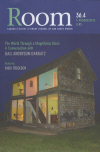Room – 2013
Room is Canada’s oldest literary journal that is both by and about women; each issue focuses on women and gives them a space to “speak and connect” with one another. This issue tackles the theme of “A progressive lens,” promising to bring forth and support new ideas in the form of poetry, fiction, and nonfiction along with an interview and a few book reviews.
Room is Canada’s oldest literary journal that is both by and about women; each issue focuses on women and gives them a space to “speak and connect” with one another. This issue tackles the theme of “A progressive lens,” promising to bring forth and support new ideas in the form of poetry, fiction, and nonfiction along with an interview and a few book reviews.
One of the most impactful poems in this issue is Nico-Mara McKay’s “Cartographer of Strange Curves.” Cartography is the study and practice of making maps, but these maps don’t have to be in our modern day conception of maps in relation to land; they can be in relation to the mapping of anything, such as a face. McKay writes:
There are smaller things–
The freckles on your face, your hands
Unhindered by reason or regret
A thin line delicately traced
Scaled beyond human reckoning
McKay is mapping the face of another and in doing so is also defining the distance between the “I” and the “You” within the poem, thus defining the cartography of space between two entities as McKay continues:
Boarders defined, yet there remains
A field beyond argument
The distance between two souls
McKay also capitalizes the first word of each line in order to help define each part of the cartography or map; the whole poem is the map, and each line is a small, distinct part of it.
“Familiar,” a creative nonfiction piece by Nadine McCallen, tells the story of two seemingly young lovers who leave home for a couple of days, which seems like an eternity to the couple and alludes to the couple’s decision for an abortion. The work begins: “Mazzy is full of plastic skeletons, bare, bony shoulders, ancient crumbs and lint, old skin, soggy Kleenexes, grimy coffee cups, and crusty spoons.” Mazzy is the car the young couple are living out for the duration of their trip; it is described as “bare” and “grimy,” and in many ways it represents the relationship between the two people. McCallen describes the post-abortion feeling for the character:
This morning we wake up in the country by a waterfall in British Columbia; we are both like neckless caterpillars in our mummy sleeping bags, toques and big knit sweaters, sagging long johns and double layered socks. . . . You smile at me with one furry-browed eye sneaking out of hibernation. I look away now, I know it though I deny it has meaning, and you don’t ask because you already know.
Again she mentions mornings saying “The mornings are misty now, the dampness is persistent; it goes straight to the bone.” McCallen quickly turns morning into mourning while at the same time bringing the shame that comes with abortion into the picture saying, “I look away now.” The piece ends, bringing the theme of distance into the picture once again, “It is only a matter of miles, a matter of moon cycles.” As quickly as this piece begins, it ends, much like the life of the unborn that is hinted at throughout the work. “Familiar” is a quick read and definitely a work you should not skip over.
Molly Lynch’s “Acute Failure” is a fiction piece that, on the surface, is about the main character Magnolia and her desire to save her mother who has failing kidneys. As the reader digs deeper into the story, though, it becomes apparent that this story is also meant to display the ways in which women can be asked to prostitute themselves or arguably use themselves or their bodies to get something they want or need. In Magnolia’s case, she puts up with abuse and forced sex to get a kidney from her abusive boyfriend for her mother who is on dialysis. The work leaves the reader questioning, “What is female empowerment?” Is it being able to use yourself to get what you want or is it being able to say no and protecting yourself and your body?
This issue of Room also includes an enlightening interview by Lorrie Miller with Gail Anderson-Dargatz, some captivating art from Heather Benning revolving mainly around dollhouses, and several well thought-out reviews of recent books. While Room is by and about women, it does not mean that men can’t get something meaningful from this journal; men and women alike should head over to Room’s website, order a copy, and enrich their lives.
[www.roommagazine.com]





